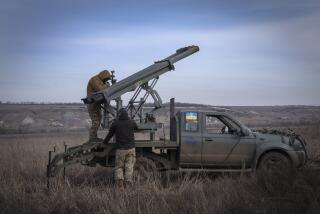White House: Arms to Syrian rebels due ‘in the weeks to come’
WASHINGTON- -The White House said Friday that it will take weeks to deliver weapons and ammunition to Syrian rebels despite the rising death toll in the civil war and pleas for speedy assistance from anti-government forces.
The United States has created supply pipelines and set up intermediaries to deliver humanitarian aid to the opposition for several months and will use them to send direct military assistance to the Supreme Military Council, an umbrella group of rebel factions, Deputy National Security Advisor Ben Rhodes said.
“In terms of timelines, we’ve established these pipelines, so I think you should see this as a continuum,” Rhodes said. “There’s already material that has been flowing in to the opposition, and that will continue to be the case in the weeks to come. So, we don’t anticipate that this is something that is far off into the future.”
Another administration official confirmed that the administration is talking about delivery in a matter of weeks, not months. They follow recent rebel losses to President Bashar Assad’s security forces and their allies in Hezbollah, the Lebanese militant group, and reports of fresh fighting in the country.
PHOTOS: 2013’s memorable political moments
Rhodes declined to say what military equipment Obama plans to send. Other officials said the administration plans to send small arms at first and may provide antitank weapons at some point. Some Obama advisors are skeptical of providing shoulder-fired anti-aircraft weapons out of concern that they could fall into the hands of al Qaeda and other Islamist groups that are seeking to topple Assad.
Gen. Salim Idris, head of the U.S.-backed military wing of the Syrian opposition, said in an interview with the Al Arabiya TV network that he hopes to receive the “weapons and ammunition we need in a few weeks.”
The intensity of fighting and recent gains by government troops and Hezbollah created concern at the White House that the rebels may be in danger of losing the war. A new U.S. intelligence assessment that Assad’s forces used nerve gas several times pushed Obama to reverse himself and help arm the rebels, although at a slower pace than advocates had hoped.
Rhodes did not rule out eventually sending U.S. aircraft to impose a no-fly zone in Syrian airspace. But he said an air campaign would be more “difficult and dangerous and costly” than it was in Libya, where U.S.-led airstrikes helped rebels oust dictator Moammar Kadafi in 2011.
Obama plans to meet with Russian President Vladimir Putin next week at the G-8 summit in Northern Ireland, and is expected to ask Putin to withdraw Russian support from Assad. U.S. officials hope Russia can apply pressure to bring some elements of the Syrian regime together with the opposition to work toward a political settlement.
Leaders should pressure Assad “to come to the table in a way that relinquishes his power and his standing in Syria,” Rhodes said.
“We don’t see any scenario where he restores his legitimacy to lead the country,” Rhodes said. “So we’re fundamentally making an interest-based argument to the Russians that they can best protect their interests by being a part of a political settlement that is real and that enables a transition away from Assad’s rule.”
Twitter: @cparsons
kathleen.hennessey@latimes.com
Twitter: @khennessey
More to Read
Start your day right
Sign up for Essential California for news, features and recommendations from the L.A. Times and beyond in your inbox six days a week.
You may occasionally receive promotional content from the Los Angeles Times.








